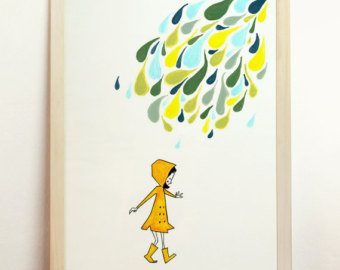Seeing the Whole Person
In the days after my Dad died, his grandchildren put together a display of photos. There were pictures of:
- A grandchild steering his garden tractor while sitting on Dad’s lap.
- Christmases past surrounded by kids and grandkids.
- Dad giving his daughters away at their weddings.
- Dad and Mom, barely out of their teens, at their own wedding.
- A 12-year-old farm boy standing proudly next to his first deer.
Suddenly, it seemed like all of him was there. Not just the man I had seen the last time we were together: an old man who could barely hear anything you said. I also saw him in the prime of his life. I saw the young man I remembered from when I was a boy. My memories brought all of him together in a way that would not have been possible when he was alive.
Our memories ambush us years after the funeral. The smell of fresh-baked bread reminds me of one grandmother. The sight of a new commemorative postage stamp reminds me of the the other, who encouraged me to collect them. What triggers your memories of those long-gone?
When we remember our loved ones, we re-member them. We put them — and ourselves — together in a new way.
Re-membering Together
People gather after someone dies to share their memories. It may be the calling hours at the funeral home; an Irish wake; or in Greek Orthodox culture, a dinner honoring the deceased on the one-year anniversary of their death. Jews observe Shiva for a few evenings after the funeral. Friends, neighbors, and extended family visit the immediate family in their home.
Every traditional community has a way of creating these gatherings. Our secular suburban life is poorer when we don’t have them. But, just sharing a cup of coffee with good friends in those first few days after a death can help. In this pandemic era, we have even learned how to gather on Zoom.
We gather to listen with empathy as the most-bereaved talk about losing their loved one. Telling these stories can help them process their loss. But, it also helps the most-bereaved to hear stories about their loved one from others who knew that person.
In response to the first of this series, my sister-in-law, Jo-Anne, said that everyone’s life is like an elephant. The people who know us are like the blind men who famously announced their true, but very different, conclusions about that elephant. We all see only part of a person — including our parent, spouse, sibling, or child. Hearing stories about them from others helps us fill out our picture of this person who is so important to us.
I came away from my Dad’s funeral with a much bigger picture of him. I listened to people who had worked with him at the electric company, or on the volunteer rescue squad and the town board. Neighbors told me how he had helped them. After all, he could fix anything; from your refrigerator to your kid’s broken arm.
This also happens when I gather with my brother and sisters. Each of them related to our parents differently. As I listen to their stories, they fill in the picture, and at the same time, deepen the mystery, of who my parents were.
The Pieces Come Together in a New Way
“Closure” is a myth. We have this fantasy that, after someone important dies, we will go through the stages of grief: denial, anger, depression, and acceptance. Then we should be able to pick up where we left off.
Instead, we are changedas we re-member our dead
into our lives.
The Mystery of Your Existence
All my grandparents were born in the 19th century. All my grandchildren were born in the 21st century.
If you are now in the Third Half of your life, you can probably say the same about many of the people who loomed large in your childhood and some of the people who are dearest to you now. And, here you are in between the past and the future.
We are participating in some kind of grand scheme of things. My hope is that we are moving toward Shalom, wholeness, peace, good will toward all people, and toward Creation itself.
Remembering and passing on our memories is one way we actively participate in this grand scheme.
The Bible says God does not forget us. Whatever resurrection is, it is definitely a kind of re-membering.
Remembering is the work of grief that lasts long after the tears stop flowing.
There are three more aspects of this work:
- We make sense out of our memories
- We forgive.
- We decide what we believe about life, death, and life after death.”
I will write about them soon.
Let me leave you with this beautiful litany:
A Litany of Remembrance – We Remember Them
In the rising of the sun and in its going down,
we remember them.
In the blowing of the wind and in the chill of winter,
we remember them.
In the opening of buds and in the rebirth of spring,
we remember them.
In the blueness of the sky and in the warmth of summer,
we remember them.
In the rustling of leaves and in the beauty of autumn,
we remember them.
In the beginning of the year and when it ends,
we remember them.
When we are weary and in need of strength,
we remember them.
When we are lost and sick at heart,
we remember them.
When we have joys we yearn to share,
we remember them.
So long as we live, they too shall live, for they are now a part of us,
as we remember them.
by Rabbi Sylvan Kamens and Rabbi Jack Riemer
From Gates of Prayer, published by Central Conference of American Rabbis.
Image credit: Raul Diaz, Berlin Germany, Holocaust Memorial https://www.flickr.com/photos/radzfoto/2621999611/in/dateposted/













